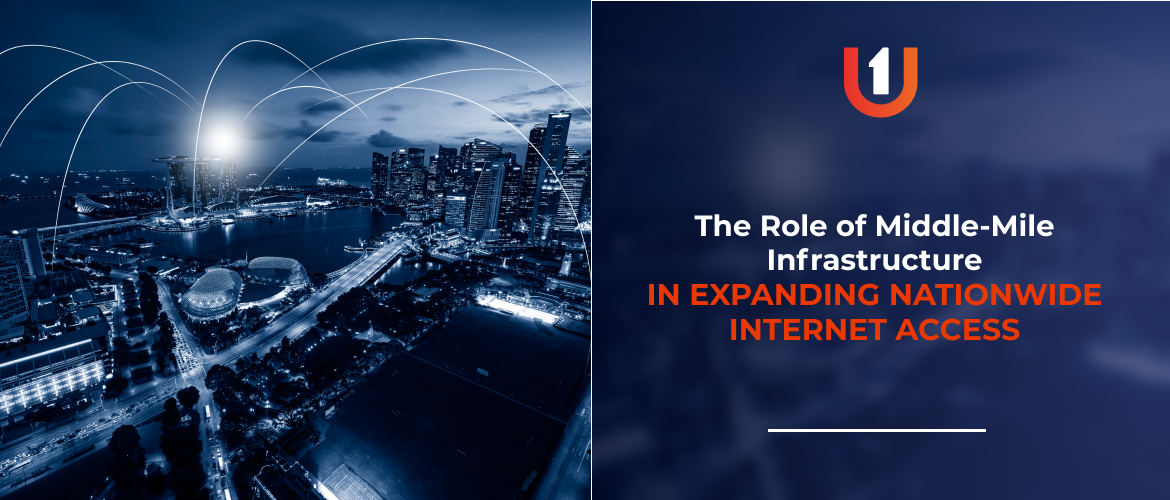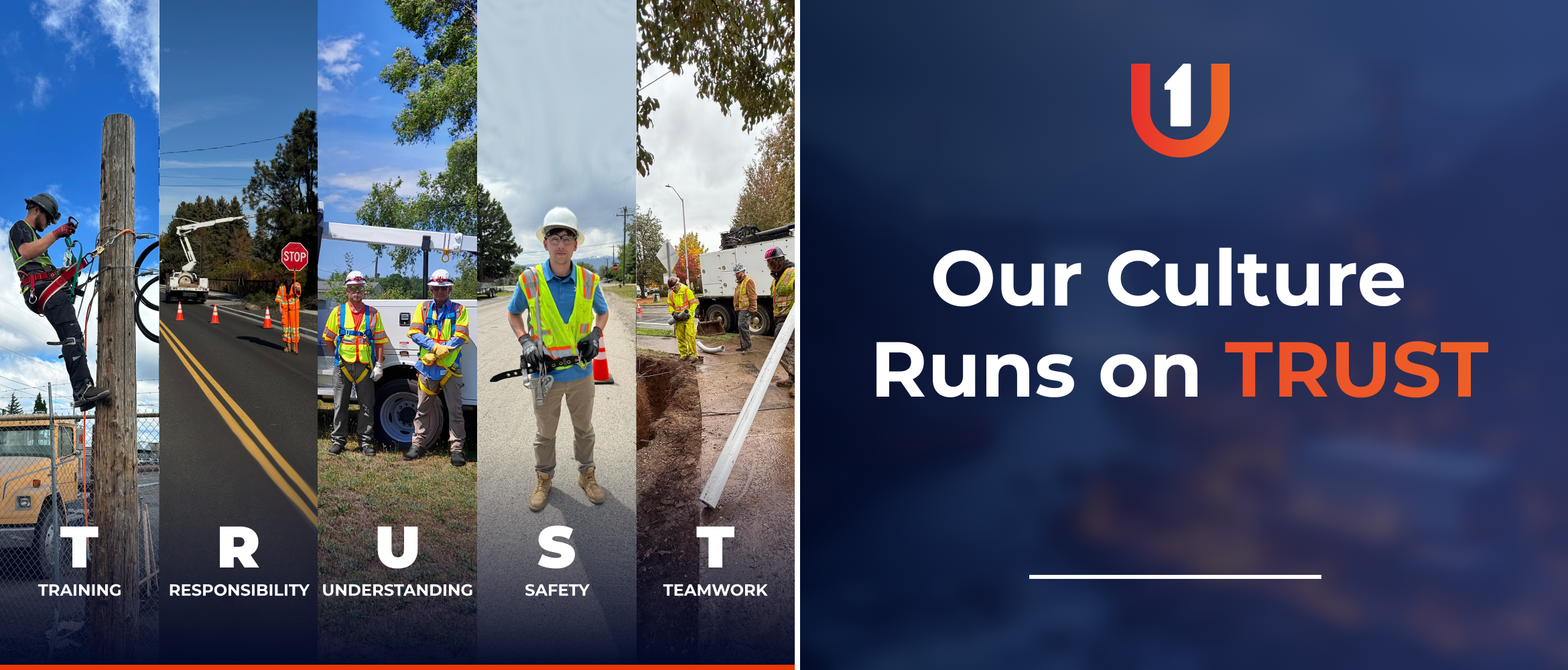News
We don’t expect success, we work for it. Become a part of an amazing team!

The Role of Middle-Mile Infrastructure in Expanding Nationwide Internet Access
As broadband access becomes essential infrastructure, attention is shifting toward the parts of the network that enable expansion, but are rarely visible to the public. Middle-mile infrastructure, which connects core internet networks to local last-mile service areas, is one of those critical components. At Utilities One Group, we are directly involved in planning, constructing, and delivering middle-mile fiber networks that support broadband growth across the United States.
This article explains why middle-mile infrastructure has become a national priority, its impact on underserved areas, and the role Utilities One Group plays in supporting these efforts through construction, engineering, and delivery.
The National Shift Toward Middle-Mile Investment
Historically, most broadband discussions have focused on the last mile—the direct connection to homes and businesses. However, in many regions, predominantly rural and remote areas, the most significant barrier to service isn’t the last mile at all. It’s the lack of affordable, high-capacity middle-mile infrastructure that connects those areas to the broader internet.
In 2025, the middle mile is in the spotlight:
-
The NTIA’s Enabling Middle Mile Broadband Infrastructure Program has awarded nearly $1 billion to support over 12,000 miles of new fiber routes across the country.
-
States like Kansas have launched significant construction efforts, with recent examples including a $43 million statewide middle-mile project now underway.
-
Organizations such as the Fiber Broadband Association have publicly called for the modernization of middle-mile networks to meet updated capacity and performance demands.
This national investment is a response to growing recognition that middle-mile gaps can block entire regions from accessing affordable broadband.
Why Middle-Mile Infrastructure Matters
Middle-mile fiber routes serve as high-capacity pathways between data centers, regional hubs, and local internet providers. When these routes are unavailable or outdated, last-mile providers face higher backhaul costs and limited performance, resulting in slow, expensive, or infeasible service deployment in low-density areas.
This has made middle-mile infrastructure essential to the success of broader programs, such as the Broadband Equity, Access, and Deployment (BEAD) initiative. For BEAD-funded networks to succeed, they must connect to reliable middle-mile systems that can deliver the required bandwidth and latency performance.
For underserved areas, particularly rural and tribal communities, middle-mile availability can determine whether high-speed internet reaches the region at all.
Utilities One Group’s Role in Middle-Mile Expansion
Utilities One Group brings experience and full-scale capability to middle-mile fiber construction. Our services are structured to support both public and private sector deployments from start to finish.
Key capabilities include:
Engineering and Network Planning: We develop middle-mile routes that strike a balance between performance, cost, and permitting feasibility across state and regional lines.
Underground and Aerial Construction: Our field teams deliver long-haul fiber using trenching, boring, pole attachments, and conduit placement suited to the environment.
Fiber Splicing, Testing, and Integration: Every mile of fiber is professionally spliced and tested to meet required optical standards for transport networks.
Utilities One Group’s ability to scale operations across markets enables us to execute complex infrastructure projects that meet federal and state broadband goals.
Trends Shaping Middle-Mile Design and Delivery
As the industry evolves, new challenges and innovations are reshaping how middle-mile infrastructure is planned and deployed.
Capacity Planning and Network Resilience:
Recent reports highlight that many existing middle-mile routes are not designed for today’s bandwidth demands. Utilities are now rethinking fiber configurations to support multi-terabit throughput and built-in redundancy.
Lean Fiber and Rapid Deployment Models:
To address labor shortages and accelerate timelines, providers are using slimmer fiber bundles and plug-and-play assemblies. These methods reduce material handling and shorten construction windows.
Hybrid Infrastructure Models:
Middle-mile routes are increasingly integrated with fixed wireless, satellite, or microwave segments, especially in areas where terrain or access presents challenges.
Utilities One Group adapts to these trends through flexible deployment strategies and a field-first approach that prioritizes cost efficiency, long-term performance, and regulatory readiness.
Looking Ahead
The momentum behind middle-mile deployment is not slowing down. As states continue to release broadband grant funding and infrastructure partners begin construction, middle-mile projects will determine the pace and success of broadband expansion for years to come.
Utilities One Group remains committed to supporting these builds with the same professionalism, coordination, and engineering accuracy we bring to all infrastructure work.
Share Via:
Related Posts

18 December, 2025
Behind the Scenes: End of Year Work and Welcoming 2026
At Utilities One Group, this time is used to bring people together, recognize the work done throughout the year, and prepare operations for the months ahead. The goal is simple: enter 2026 aligned, ready, and focused on delivering reliable infrastructure.

23 October, 2025
Dust, Heat, and Durability: Engineering Solar Panels for Extreme Climates
As solar energy expands into some of the world’s harshest environments, engineers are developing advanced materials and designs to help panels endure extreme heat, dust, and humidity. Innovations such as thermal-resistant encapsulants, corrosion protection, and passive cooling systems enhance efficiency and durability, supporting reliable and sustainable solar power in challenging conditions.
300 W Somerdale Rd, Suite 5E, Voorhees Township, NJ 08043
COPYRIGHT © 2026 UTILITIES ONE
